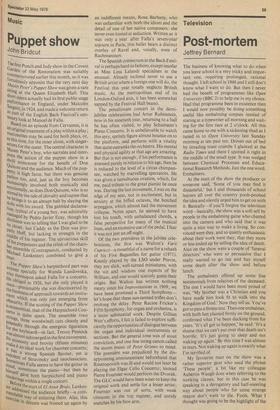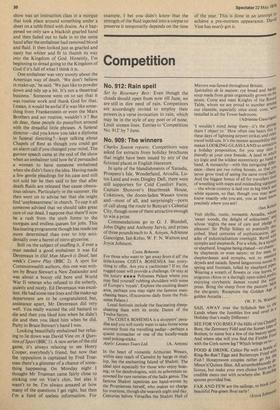Television
Post-mortem
Jeffrey Bernard
The business of knowing what to do when you leave school is a very tricky and important one, requiring prolonged, rational thought. I left school in 1948 and I still don't know what I want to do. But then I never had the benefit of programmes like Open University (BBC 2) to help me in my choice. Had that programme been in existence then I would now possibly be doing something useful like embalming corpses instead of staring at a typewriter all morning and waiting for the first race at 2 o'clock. All this came home to me with a sickening thud as I tuned in to Open University last Sunday morning at ten past ten. Driven out of bed by invading toast crumbs I glanced at the Radio Times and there I spotted it right in the middle of the small type. It was wedged between Chemical Processes and Educational Research Methods. Just the one word. Embalmers.
At the start of the show the producer or someone said, Some of you may find it distasteful,' but I and thousands of school leavers all over the country pooh-poohed the idea and silently urged him to get on with it. Basically—if you'll forgive the television word—basically, the show was a soft sell by people in the embalming game who chatted into the camera and who said that it was quite a nice way to make a living. So convinced were they, and so quietly enthusiastic about their work were they, that they more or less ended up by selling the idea of death. Also on the show were a couple of 'funeral directors' who were so persuasive that I really wanted to go out and buy myself some death after the show and before lunch.
The embalmers offered up some fine testimonials from relatives of the deceased. The one I would have been most proud of was, 'My brother was a Christian and you have made him look fit to walk into the Kingdom of God.' Now they tell us. You've got to pass a fitness test. Then one embalmer, with both feet planted firmly on the ground, confirmed what I've been ducking from for years. 'It's all got to happen,' he said. 'It's a shame that we can't put over that death isn't horrific. It's just going to sleep and not waking up again.' By this time I was almost in tears. Not waking up again is exactly what I'm terrified of.
My favourite man on the show was a rather superior gent who used the phrase 'These people', a bit like my colleague Auberon Waugh does when referring to the working classes, but in this case he was speaking in a derogatory and half-sneering way about people who for some strange reason don't, want to die. Fools. What I thought was going to be the highlight of the
show was an instruction class in a morgue that took place around something under a sheet on a table fitted with drains. As it happened we only saw a blackish gnarled hand and then faded out to fade in to the same hand after the embalmer had removed blood and fluid. It then looked just as gnarled and nasty but whiter and fit to thumb its way into the Kingdom of God. Honestly, I'm beginning to dread going to the Kingdom of God if it's full of what I think it is.
One embalmer was very snooty about the American way of death. 'We don't believe in make-up,' he said. 'We just like to powder down and tidy up a bit. It's not a theatrical business.' Someone went on to say that it was routine work and thank God for that. I mean, it would be awful if it was like something from Frankenstein or even the Marx Brothers and not routine, wouldn't it ? But oh dear, these people do pussyfoot around with the dreadful little phrases. A funeral director—did you know you take a diploma in funeral directing ?—kept talking about Chapels of Rest as though you could get an alarm call if you changed your mind. The guvnor speech came at the end of the show when an embalmer told how he'd persuaded a woman to have someone embalmed when she didn't fancy the idea. Having made a few gentle pleadings for his case and still not sold her he then said to her that after death fluids are released that cause obnoxious odours. Particularly in the summer. He then went on to advise her that she might find 'unpleasantness' in church. To cap it all someone advised that we should take great care of our dead. I suppose that there'll now be a rush from the sixth forms to the morgues and endless queues for jobs. This fascinating programme though has made me more determined than ever to trip accidentally over a barrel of nitro-glycerine.
Still on the subject of snuffing it, if ever a man needed a good embalmer it was Ed Devereaux in Old Man March is Dead, last week's Centre Play (BBC 2). A spot for Commonwealth authors, this one was written by Bruce Stewart a New Zealander and was about a boozy old bore and World War 11 veteran who refused to die soberly, quietly and nicely. Ed Devereaux was excellent. He had some nice lines and the make-up department are to be congratulated, but, assistance apart, Mr Devereaux did very well. You really wanted the old bastard to die and then you liked him when he didn't die and then you liked him when he did. Putty in Bruce Stewart's hand I was.
Looking beautifully embalmed but refusing to lie down was David Vine on A Question of Sport (BBC 1). A new series of the old game, it's always relaxing to see Henry Cooper, everybody's friend, but now that the opposition is captained by Fred Trueman there's a glimmer of a chance of something happening. On Monday night I thought. Mr Trueman came fairly close to sticking one on Vine's chin, but alas it wasn't to be. I'm always amazed at how many of the questions I get right, but then I'm a fund of useless information. For
example, I bet you didn't know that the strength of the fluid injected into a corpse to preserve it temporarily depends on the time
of the year. This is done in an attempt 1°, achieve a pre-mortem appearance. David Vine has nearly got it.



































 Previous page
Previous page